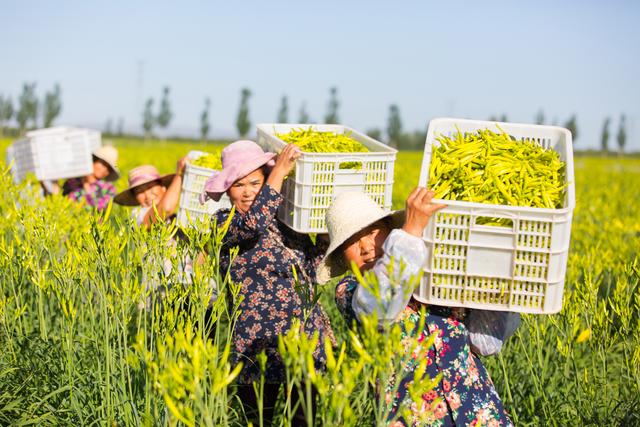China develops featured industries to boost rural revitalization
China's central government has approved a fiscal budget of 156.1 billion yuan ($23.84 billion) to support the growth of advantageous industries featuring local characteristics in less developed regions of the country this year, all with an aim to consolidating poverty alleviation outcomes and promoting rural revitalization.

Farmers harvest daylilies in Yunzhou district, Datong. (Photo/Xinhua)
The country has also established over 300,000 industrial bases of various kinds in once-impoverished counties. As of November 2020, it had set up 2.241 million farmers' cooperatives to spur continued growth in the rural economy.
Zoucheng city in east China's Shandong province has been vigorously developing its edible fungus industry to help farmers increase their incomes.
The city has cultivated over 20 varieties of high-quality edible fungi and can now generate a total yield of up to 350,000 tons of fresh fungi annually. By the end of 2020, Zoucheng had planted 2,230 hectares of edible fungi with an output value worth more than 3.3 billion yuan.
The edible fungus industry has now grown into a pillar industry in the city's Dashu township, which previously had no such pillar industry in the past. Two years ago, the building of an edible fungus processing factory was completed in the township, with the factory featuring smart and fully mechanized production processes.
"Our factory now produces 550,000 bottles of mushrooms and 280 tons of enoki mushrooms a day, and our annual output value has hit 400 million yuan," said one of the managers from the factory, adding that the factory has so far cultivated over 900 professional farmers.
Diaoyutai village is one of the beneficiaries of the township's supportive policies. Dashu township allocated specific funds for rural revitalization as well as inviting experts and a leading edible fungi company to build greenhouses to cultivate shiitake mushrooms in Diaoyutai, where crops had low yields due to infertile land, according to Zhu Yujian, Party chief of the village.
In November 2019, the village's farmers' cooperative signed contracts with seven farming families, contracting them to operate the first batch of 20 greenhouses. The edible fungi company not only sent technicians to guide the farmers on how to cultivate shiitake mushrooms, but it also directly purchased products from them.
Villager Zhu Hongwei was able to contract two greenhouses and garnered a net income of about 40,000 yuan during the first harvest season. "Mushroom cultivation is profitable, and I feel more confident in my business as I’ve learnt how to collect mushrooms and master the techniques of pest control," Zhu said excitedly.
Yunzhou district, in Datong city of north China's Shanxi province, has rolled out over 40 incentive-orientated policies to develop the daylily industry, making it a cash cow in helping farmers to increase their incomes.
Yunzhou has built irrigation facilities for all local fields growing daylilies, a kind of edible flower used in traditional Chinese medicine, and granted a subsidy of 500 to 1,000 yuan per mu (1 mu is 667 square meters) to daylily growers in the first three years after they joined the business. The district has also taken out insurance against risks on behalf of the growers and hires pickers from other regions during the harvest season.
To encourage daylily cultivation, 83 chiefs of village Party branches and 650 Party members in Yunzhou have taken the lead in expanding the cultivation of daylilies. In addition, 81 village officials and outstanding growers have joined hands to establish farmers' cooperatives to grow daylilies and have helped impoverished households increase their incomes through the transfer of land use rights.
Now growing daylilies is very popular in the district, with the total area of daylily plantations increasing from about 1,333 hectares 10 years ago to the current area of 11,333 hectares, according to An Yiping, director of a department responsible for the daylily industry in the district.
Yunzhou has also built daylily-planting bases with a total area of around 3,333 hectares to standardize the growing and processing of daylilies
In Daibu township, Huize county, situated in southwest China's Yunnan province, Duan Zidong, a strawberry grower, never expected that the planting area of summer strawberries would increase from about 2.7 hectares in 2012 to the current extent of 5,333 hectares.
Back then, Duan was the first farmer to grow strawberries in the town during the summer, having taken advantage of natural local conditions that feature a relatively cool climate, combined with abundant light, heat and water, all of which are very suitable for successfully cultivating strawberries in the summertime.
So far, Duan has helped roughly 300 rural families to grow summer strawberries, generating an overall annual revenue of more than 100 million yuan.
The output value for approximately 0.07 hectares of summer strawberries is close to 40,000 yuan, which hence provides a boost to farmers' incomes, the man said, adding that ordinary workers engaged in the town’s strawberry industry are able to earn an annual income of more than 20,000 yuan.
Daibu was a severely impoverished town before developing its strawberry industry, with more than 80 percent of villagers securing jobs outside their hometown. "Now many villagers have returned to the town and can find a job near their home thanks to the cultivation of strawberries," he said.
Duan's success could not have been achieved without the township's efforts to strengthen the development of agricultural infrastructure, including over 100 infrastructure projects focusing on comprehensive land management, transportation, water conservancy, and electric power.
The man said he has additional plans to build a processing factory to develop the added-value processing of strawberries and further expand the locality’s industrial chain.
Photos
Related Stories
- China lifts 770 million rural people out of poverty: white paper
- A Path Forward
- China sets role model for global poverty reduction
- Camellia oleifera lifts environment, brings economic benefits to residents in central China
- How China has lifted nearly 800 mln people out of poverty
- Xi's remarks on China's poverty alleviation
- Poverty Alleviation: China's Experience and Contribution
- China issues white paper on poverty alleviation
- China's poverty reduction "inspiring experience," say experts
- China: A role model for global poverty alleviation
Copyright © 2021 People's Daily Online. All Rights Reserved.










